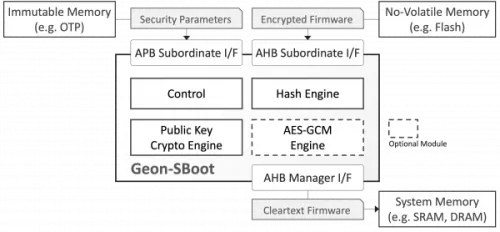GEON-SBoot is an area-efficient, processor-agnostic hardware engine that protects SoC designs from booting with malicious or otherwise insecure code.
The security platform employs public-key cryptography (which stores no secret on-chip) to ensure that only unmodified firmware from a trusted source is used by the system. It also enables secure firmware updates over-the-air (OTA) and can prevent booting from revoked firmware versions. Optionally, GEON-SBoot can use symmetric encryption to protect the confidentiality of the firmware and prevent other devices from running firmware clones.
Designed for straightforward use in nearly any SoC, GEON-SBoot works with all modern architectures including RISC-V and ARM. It requires no software assistance from the host CPU, is independent of the memory types used, and uses standard interfaces. It further gives designers great flexibility in the boot control flow.
The isolated GEON-SBoot subsystem interfaces to the host system via three AMBA® ports: a subordinate AHB port for receiving the encrypted firmware, an AHB manager port for writing the authenticated, decrypted firmware to the system’s memory, and an APB subordinate port for receiving the security parameters. The security parameters (i.e., a hash of the public key and the symmetric key if used) are typically stored in immutable memory, constituting the root of trust. GEON-SBoot reports boot success or failure on its status register and via dedicated interrupt lines. It can optionally make its crypto accelerators available to the host system post-boot.
The GEON-SBoot core is production-proven and adheres to the industry’s best coding and verification practices to ensure trouble-free implementation in ASIC or FPGA technologies.
Secure Boot Hardware Engine
Overview
Key Features
- Protection Layers
- Ensures integrity and authenticity of boot image
- Prevents any firmware down-grade (anti-rollback)
- Optionally protects confidentiality and prevents firmware cloning
- Complete software and hard-ware isolation from the host SoC
- Public-Key Authentication Benefits
- No secret on die for resistance to physical and side-channel attacks and easy deployment
- Over The Air updates
- Immune to break-one break-all scenarios
- Fast & Compact
- Minimal boot time impact: typically from sub-ms to a few ms
- From 50k gates and 8k to 11k bytes of memory
- Cryptographic Algorithms
- Asymmetric authentication
- RSA signature verification with key lengths 2,048, 3,072 and 4,096 bits (default)
- ECC signature verification with NIST-validated( i.e. P-224, P-256, P-384, & P-521) or custom curves (option)
- SHA3-256/384/512 Hashing or SHA-244 (option)
- Symmetric authenticated decryption with AES-GCM with key length of 128 or 256 bits (option)
- Asymmetric authentication
- Easy to Use and Integrate
- AMBA AHB and APB interfaces
- Autonomous & isolated operation requires no software assistance.
- Protected firmware can be broken in fragments, each stored at different memory regions. Multi-stage boot support
- Crypto acceleration engines can be made available to the system after boot
- Reusable & Portable
- Processor-Agnostic: works with any host processor(s) or SoC
- Process-Independent RTL design
Block Diagram

Deliverables
- Verilog RTL source code or targeted FPGA netlist
- Comprehensive Documentation
- Software tool for signing and encrypting boot images
Technical Specifications
Availability
Now
Related IPs
- Very Low gate Count, Hardware level, Software Data Isolation and Master level Data protection engine.
- Embedded Flash Protection with Hardware Root of Trust and Lite Crypto Engine
- SHA-384 and SHA-512 Secure Hash Crypto Engine
- tRoot V023 FS Hardware Secure Module, ASIL-B compliant (w/ ARC EM22FS)
- Secure Boot Software Development Kit
- tRoot Fx Hardware Secure Modules: Programmable Root of Trust